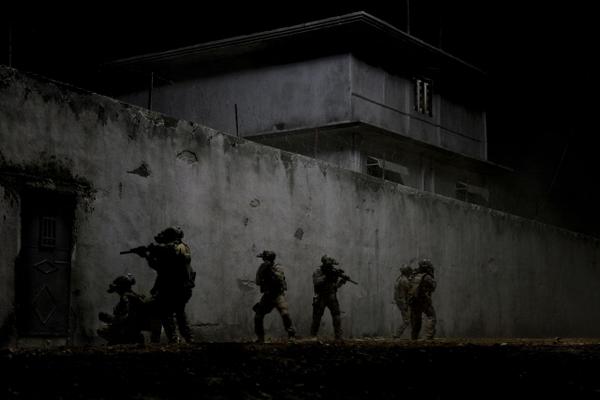
Zero Dark Thirty — The Long Game
Zero Dark Thirty is a tautly constructed account of the pursuit by the US military of a terrorist leader who ordered the 9/11 attacks, with most of those US characters constructed to seem professional, competent and committed to delivering justice.
It expands the cinematic military vocabulary that Bigelow deployed in The Hurt Locker, adding visual textures to bring realism to the worlds of military intelligence and covert operations. The film seems real, which won’t necessarily work in its favor. Bigelow has managed to get a performance out of Jessica Chastain that expands anything that I thought would be possible from her. We’ll see whether that works at the box office.
Chastain should get an Oscar nomination; so should Bigelow for Best Picture and Best Director. I expect this film to win over the Academy – the third important vote for Obama from Hollywood this year (first Hollywood voted with its money to help fund the election; second, they voted for him as president for another term; third, I expect they’ll vote for Zero Dark Thirty at the Academy Awards.)

Zero Dark Thirty – Quietly, Guys
Critics will rally behind the film, as they have already done. I don’t think that the audience will be huge – there’s a lot of Middle East war fatigue, these cinematic textures and the murky world of intelligence are a constant presence on television, and there is a sense of the killing of Osama Bin Laden and the war on al Qaeda being old news. Box office will trail behind critical acclaim.
Is it controversial? I think the reliance on torture and the moral equanimity about it will be more controversial outside the US than inside. (Most of the rest of the world gives lip-service to international law and codes of conduct in war.) I think Americans got used to the fact that brutal methods were used in the war on terror. The only American who said he thought that those methods were not torture was George W. Bush, and, when asked why, he said routinely that the White House lawyers working for him told him that those methods were not torture. The telephone voices during the 9/11 attacks at the top of the film set us up for revenge – which seems justified, but achieved in a deliberate reasoned professional courageous manner in the film because of the suffering that was caused to the victims. The movie gives us a methodical realistic campaign to reach that goal. Determined, but controlled. Murder in moderation?
Here I see a parallel with Obama’s strategy in the war on terror, and with his personality. The Americans pursuing Bin Laden are playing the long game, working meticulously, selflessly, but no less determined to kill Bin Laden when they find him. This extended commitment can also be read as a parallel to the long game that Obama is playing with the economy – not bringing the instant gratification of a tax windfall or an overnight recovery. The downside of that approach is the understated Obama that we saw in the first debate with Romney.
Bigelow (along with screenwriter Mark Boal) is sure to praised for bringing cinematic credibility to a female character who can be as tough as anyone in pursuing an international criminal. Maybe Boal will win some awards, too. But consider the women who have been in the news recently for their proximity to the leadership in foreign policy. Susan Rice, a possible nominee for Secretary of State, ha fallen victim to an inquiry over whether she provided accurate information to senators about the attack on the US consulate in Benghazi that killed the US ambassador to Libya. It has not become the scandal that the Right hoped it would be – witness Tom Ricks on this subject in Foreign Policy and on Fox, denouncing the network for trying to turn it into Watergate. Still, Rice’s judgment was in question – so was Obama’s, for his fervor in supporting and defending her – to a point. There’s some real dramatic complexity to this story.
And then there is true farce (and maybe much more) in the fall of David Petraeus, straight-laced cerebral architect of wars in Iraq and Afghanistan (or so we thought), amid revelations about his affair with his admiring biographer, a former active duty specialist in intelligence who angered other admirers of the general (and opened a can of worms about the Desperate Housewives of CENTCOM in Tampa). Who can resist the Lebanese twins partying with Petraeus and his successor in Mardi Gras beads, with the general’s dowdy wife eyeing it all suspiciously? Are they really part of a sleeper cell?
Back to controversy – is it controversial that US helicopters and commandos violated Pakistan’s territorial integrity by entering that country in the raid? Not after the fact, and certainly not for Americans.
Is it controversial that Bigelow may have gotten privileged access to classified information from the military? The military helps filmmakers all the time. If some Seals who supported Romney take issue with the movie, plenty of others who helped Bigelow make the film will defend her.
If the Right gets shrill about Zero Dark Thirty and its perceived pro-Obama message, the film’s mood of restraint should stymie those arguments.
Should the film have come out before the election? I think so, in the belief that truth should not be suppressed in the interest of providing an even playing field for the two presidential candidates – no such even field ever exists anyway. Would it have made a difference? It would not have hurt Obama. His credibility only rises if the people working for him are shown to be professionals with cool nerves, which is how he wants to be seen.
Before you conclude that a generation of women will decide to sign up for the military or the CIA after seeing this iconic tale of determination and achievement in a man’s world, remember that another potential nominee this year (in the documentary section) is The Invisible War, Kirby Dick’s investigation into the abuse of women in the armed forces.
Dick (what a name for this probe) interviews woman after woman – from the Coast Guard, Army, Navy and Marines – and the stories of rape and harassment just keep coming. The lesson from this troubling documentary for women who might still want to serve their country – don’t do it, no matter what your heart seems to be telling you, or what your brothers, father and grandfathers have done for generations.
I’m surprised that The Invisible War – which needs no dramatization – has not gotten more attention. You’ll never hear “thank you for your service” the same way again.
